- Home
- Jack Kerouac
On the Road Page 16
On the Road Read online
Page 16
We went to Old Bull Lee’s house outside town near the river levee. It was on a road than ran across a swampy field. The house was a dilapidated old heap with sagging porches running around and weeping willows in the yard; the grass was a yard high, old fences leaned, old barns collapsed. There was no one in sight. We pulled right into the yard and saw washtubs on the back porch. I got out and went to the screen door. Jane Lee was standing in it with her eyes cupped toward the sun. “Jane,” I said. “It’s me. It’s us.”
She knew that. “Yes, I know. Bull isn’t here now. Isn’t that a fire or something over there?” We both looked toward the sun.
“You mean the sun?”
“Of course I don’t mean the sun—I heard sirens that way. Don’t you know a peculiar glow?” It was toward New Orleans; the clouds were strange.
“I don’t see anything,” I said.
Jane snuffed down her nose. “Same old Paradise.”
That was the way we greeted each other after four years; Jane used to live with my wife and me in New York. “And is Galatea Dunkel here?” I asked. Jane was still looking for her fire; in those days she ate three tubes of benzedrine paper a day. Her face, once plump and Germanic and pretty, had become stony and red and gaunt. She had caught polio in New Orleans and limped a little. Sheepishly Dean and the gang came out of the car and more or less made themselves at home. Galatea Dunkel came out of her stately retirement in the back of the house to meet her tormentor. Galatea was a serious girl. She was pale and looked like tears all over. Big Ed passed his hand through his hair and said hello. She looked at him steadily.
“Where have you been? Why did you do this to me?” And she gave Dean a dirty look; she knew the score. Dean paid absolutely no attention; what he wanted now was food; he asked Jane if there was anything. The confusion began right there.
Poor Bull came home in his Texas Chevy and found his house invaded by maniacs; but he greeted me with a nice warmth I hadn’t seen in him for a long time. He had bought this house in New Orleans with some money he had made growing black-eyed peas in Texas with an old college schoolmate whose father, a mad paretic, had died and left a fortune. Bull himself only got fifty dollars a week from his own family, which wasn’t too bad except that he spent almost that much per week on his drug habit—and his wife was also expensive, gobbling up about ten dollars’ worth of benny tubes a week. Their food bill was the lowest in the country; they hardly ever ate; nor did the children—they didn’t seem to care. They had two wonderful children: Dodie, eight years old; and little Ray, one year. Ray ran around stark naked in the yard, a little blond child of the rainbow. Bull called him “the Little Beast,” after W. C. Fields. Bull came driving into the yard and unrolled himself from the car bone by bone, and came over wearily, wearing glasses, felt hat, shabby suit, long, lean, strange, and laconic, saying, “Why, Sal, you finally got here; let’s go in the house and have a drink.”
It would take all night to tell about Old Bull Lee; let’s just say now, he was a teacher, and it may be said that he had every right to teach because he spent all his time learning; and the things he learned were what he considered to be and called “the facts of life,” which he learned not only out of necessity but because he wanted to. He dragged his long, thin body around the entire United States and most of Europe and North Africa in his time, only to see what was going on; he married a White Russian countess in Yugoslavia to get her away from the Nazis in the thirties; there are pictures of him with the international cocaine set of the thirties—gangs with wild hair, leaning on one another; there are other pictures of him in a Panama hat, surveying the streets of Algiers; he never saw the White Russian countess again. He was an exterminator in Chicago, a bartender in New York, a summons-server in Newark. In Paris he sat at café tables, watching the sullen French faces go by. In Athens he looked up from his ouzo at what he called the ugliest people in the world. In Istanbul he threaded his way through crowds of opium addicts and rug-sellers, looking for the facts. In English hotels he read Spengler and the Marquis de Sade. In Chicago he planned to hold up a Turkish bath, hesitated just for two minutes too long for a drink, and wound up with two dollars and had to make a run for it. He did all these things merely for the experience. Now the final study was the drug habit. He was now in New Orleans, slipping along the streets with shady characters and haunting connection bars.
There is a strange story about his college days that illustrates something else about him: he had friends for cocktails in his well-appointed rooms one afternoon when suddenly his pet ferret rushed out and bit an elegant teacup queer on the ankle and everybody hightailed it out the door, screaming. Old Bull leaped up and grabbed his shotgun and said, “He smells that old rat again,” and shot a hole in the wall big enough for fifty rats. On the wall hung a picture of an ugly old Cape Cod house. His friends said, “Why do you have that ugly thing hanging there?” and Bull said, “I like it because it’s ugly.” All his life was in that line. Once I knocked on his door in the 60th Street slums of New York and he opened it wearing a derby hat, a vest with nothing underneath, and long striped sharpster pants; in his hands he had a cookpot, birdseed in the pot, and was trying to mash the seed to roll in cigarettes. He also experimented in boiling codeine cough syrup down to a black mash—that didn’t work too well. He spent long hours with Shake speare—the “Immortal Bard,” he called him—on his lap. In New Orleans he had begun to spend long hours with the Mayan Codices on his lap, and, although he went on talking, the book lay open all the time. I said once, “What’s going to happen to us when we die?” and he said, “When you die you’re just dead, that’s all.” He had a set of chains in his room that he said he used with his psychoanalyst; they were experimenting with narcoanalysis and found that Old Bull had seven separate personalities, each growing worse and worse on the way down, till finally he was a raving idiot and had to be restrained with chains. The top personality was an English lord, the bottom the idiot. Halfway he was an old Negro who stood in line, waiting with everyone else, and said, “Some’s bastards, some’s ain’t, that’s the score.”
Bull had a sentimental streak about the old days in America, especially 1910, when you could get morphine in a drugstore without prescription and Chinese smoked opium. in their evening windows and the country was wild and brawling and free, with abundance and any kind of freedom for everyone. His chief hate was Washington bureaucracy; second to that, liberals; then cops. He spent all his time talking and teaching others. Jane sat at his feet; so did I; so did Dean; and so had Carlo Marx. We’d all learned from him. He was a gray; nondescript-looking fellow you wouldn’t notice on the street, unless you looked closer and saw his mad, bony skull with its strange youthfulness—a Kansas minister with exotic, phenomenal fires and mysteries. He had studied medicine in Vienna; had studied anthropology, read everything; and now he was settling to his life’s work, which was the study of things themselves in the streets of life and the night. He sat in his chair; Jane brought drinks, martinis. The shades by his chair were always drawn, day and night; it was his corner of the house. On his lap were the Mayan Codices and an air gun which he occasionally raised to pop benzedrine tubes across the room. I kept rushing around, putting up new ones. We all took shots and meanwhile we talked. Bull was curious to know the reason for this trip. He peered at us and snuffed down his nose, thfump, like a sound in a dry tank.
“Now, Dean, I want you to sit quiet a minute and tell me what you’re doing crossing the country like this.”
Dean could only blush and say, “Ah well, you know how it is.”
“Sal, what are you going to the Coast for?”
“Only for a few days. I’m coming back to school.”
“What’s the score with this Ed Dunkel? What kind of character is he?” At that moment Ed was making up to Galatea in the bedroom; it didn’t take him long. We didn’t know what to tell Bull about Ed Dunkel. Seeing that we didn’t know anything about ourselves, he whipped out three sticks of tea and said to go ahe
ad, supper’d be ready soon.
“Ain’t nothing better in the world to give you an appetite. I once ate a horrible lunchcart hamburg on tea and it seemed like the most delicious thing in the world. I just got back from Houston last week, went to see Dale about our black-eyed peas. I was sleeping in a motel one morning when all of a sudden I was blasted out of bed. This damn fool had just shot his wife in the room next to mine. Everybody stood around confused, and the guy just got in his car and drove off, left the shotgun on the floor for the sheriff. They finally caught him in Houma, drunk as a lord. Man ain’t safe going around this country any more without a gun.” He pulled back his coat and showed us his revolver. Then he opened the drawer and showed us the rest of his arsenal. In New York he once had a sub-machine-gun under his bed. “I got something better than that now—a German Scheintoth gas gun; look at this beauty, only got one shell. I could knock out a hundred men with this gun and have plenty of time to make a getaway. Only thing wrong, I only got one shell.”
“I hope I’m not around when you try it,” said Jane from the kitchen. “How do you know it’s a gas shell?” Bull snuffed; he never paid any attention to her sallies but he heard them. His relation with his wife was one of the strangest: they talked till late at night; Bull liked to hold the floor, he went right on in his dreary monotonous voice, she tried to break in, she never could; at dawn he got tired and then Jane talked and he listened, snuffing and going thfump down his nose. She loved that man madly, but in a delirious way of some kind; there was never any mooching and mincing around, just talk and a very deep companionship that none of us would ever be able to fathom. Something curiously unsympathetic and cold between them was really a form of humor by which they communicated their own set of subtle vibrations. Love is all; Jane was never more than ten feet away from Bull and never missed a word he said, and he spoke in a very low voice, too.
Dean and I were yelling about a big night in New Orleans and wanted Bill to show us around. He threw a damper on this. “New Orleans is a very dull town. It’s against the law to go to the colored section. The bars are insufferably dreary.”
I said, “There must be some ideal bars in town.”
“The ideal bar doesn’t exist in America. An ideal bar is something that’s gone beyond our ken. In nineteen ten a bar was a place where men went to meet during or after work, and all there was was a long counter, brass rails, spittoons, player piano for music, a few mirrors, and barrels of whiskey at ten cents a shot together with barrels of beer at five cents a mug. Now all you get is chromium, drunken women, fags, hostile bartenders, anxious owners who hover around the door, worried about their leather seats and the law; just a lot of screaming at the wrong time and deadly silence when a stranger walks in.”
We argued about bars. “All right,” he said, “I’ll take you to New Orleans tonight and show you what I mean.” And he deliberately took us to the dullest bars. We left Jane with the children; supper was over; she was reading the wants ads of the New Orleans Times-Picayune. I asked her if she was looking for a job; she only said it was the most interesting part of the paper. Bull rode into town with us and went right on talking. “Take it easy, Dean, we’ll get there, I hope; hup, there’s the ferry, you don’t have to drive us clear into the river.” He held on. Dean had gotten worse, he confided in me. “He seems to me to be headed for his ideal fate, which is compulsive psychosis dashed with a jigger of psychopathic irresponsibility and violence.” He looked at Dean out of the corner of his eye. “If you go to California with this madman you’ll never make it. Why don’t you stay in New Orleans with me? We’ll play the horses over to Graetna and relax in my yard. I’ve got a nice set of knives and I’m building a target. Some pretty juicy dolls downtown, too, if that’s in your line these days.” He snuffed. We were on the ferry and Dean had leaped out to lean over the rail. I followed, but Bull sat on in the car, snuffing, thfump. There was a mystic wraith of fog over the brown waters that night, together with dark driftwoods; and across the way New Orleans glowed orange-bright, with a few dark ships at her hem, ghostly fogbound Cereno ships with Spanish balconies and ornamental poops, till you got up close and saw they were just old freighters from Sweden and Panama. The ferry fires glowed in the night; the same Negroes plied the shovel and sang. Old Big Slim Hazard had once worked on the Algiers ferry as a deckhand; this made me think of Mississippi Gene too; and as the river poured down from mid-America by starlight I knew, I knew like mad that everything I had ever known and would ever know was One. Strange to say, too, that night we crossed the ferry with Bull Lee a girl committed suicide off the deck; either just before or just after us; we saw it in the paper the next day.
We hit all the dull bars in the French Quarter with Old Bull and went back home at midnight. That night Marylou took everything in the books; she took tea, goofballs, benny, liquor, and even asked Old Bull for a shot of M, which of course he didn’t give her; he did give her a martini. She was so saturated with elements of all kinds that she came to a standstill and stood goofy on the porch with me. It was a wonderful porch Bull had. It ran clear around the house; by moonlight with the willows it looked like an old Southern mansion that had seen better days. In the house Jane sat reading the want ads in the living room; Bull was in the bathroom taking his fix, clutching his old black necktie in his teeth for a tourniquet and jabbing with the needle into his woesome arm with the thousand holes; Ed Dunkel was sprawled out with Galatea in the massive master bed that Old Bull and Jane never used; Dean was rolling tea; and Marylou and I imitated Southern aristocracy.
“Why Miss Lou, you look lovely and most fetching tonight.”
“Why, thank you, Crawford, I sure do appreciate the nice things you do say.”
Doors kept opening around the crooked porch, and members of our sad drama in the American night kept popping out to find out where everybody was. Finally I took a walk alone to the levee. I wanted to sit on the muddy bank and dig the Mississippi River; instead of that I had to look at it with my nose against a wire fence. When you start separating the people from their rivers what have you got? “Bureaucracy!” says Old Bull; he sits with Kafka on his lap, the lamp burns above him, he snuffs, thfump. His old house creaks. And the Montana log rolls by in the big black river of the night. “’Tain’t nothin but bureaucracy. And unions! Especially unions!” But dark laughter would come again.
7
It was there in the morning when I got up bright and early and found Old Bull and Dean in the back yard. Dean was wearing his gas-station coveralls and helping Bull. Bull had found a great big piece of thick rotten wood and was desperately yanking with a hammerhook at little nails imbedded in it. We stared at the nails; there were millions of them; they were like worms.
“When I get all these nails out of this I’m going to build me a shelf that’ll last a thousand years!” said Bull, every bone shuddering with boyish excitement. “Why, Sal, do you realize the shelves they build these days crack under the weight of knick-knacks after six months or generally collapse? Same with houses, same with clothes. These bastards have invented plastics by which they could make houses that last forever. And tires. Americans are killing themselves by the millions every year with defective rubber tires that get hot on the road and blow up. They could make tires that never blow up. Same with tooth powder. There’s a certain gum they’ve invented and they won’t show it to anybody that if you chew it as a kid you’ll never get a cavity for the rest of your born days. Same with clothes. They can make clothes that last forever. They prefer making cheap goods so’s everybody’ll have to go on working and punching timeclocks and organizing themselves in sullen unions and floundering around while the big grab goes on in Washington and Moscow.” He raised his big piece of rotten wood. “Don’t you think this’ll make a splendid shelf?”
It was early in the morning; his energy was at its peak. The poor fellow took so much junk into his system he could only weather the greater proportion of his day in that chair with the lamp burning at noon, but
in the morning he was magnificent. We began throwing knives at the target. He said he’d seen an Arab in Tunis who could stick a man’s eye from forty feet. This got him going on his aunt, who went to the Casbah in the thirties. “She was with a party of tourists led by a guide. She had a diamond ring on her little finger. She leaned on a wall to rest a minute and an Ay-rab rushed up and appropriated her ring finger before she could let out a cry, my dear. She suddenly realized she had no little finger. Hi-hi-hi-hi-hi!” When he laughed he compressed his lips together and made it come out from his belly, from far away, and doubled up to lean on his knees. He laughed a long time. “Hey Jane!” he yelled gleefully. “I was just telling Dean and Sal about my aunt in the Casbah!”
“I heard you,” she said across the lovely warm Gulf morning from the kitchen door. Great beautiful clouds floated overhead, valley clouds that made you feel the vastness of old tumbledown holy America from mouth to mouth and tip to tip. All pep and juices was Bull. “Say, did I ever tell you about Dale’s father? He was the funniest old man you ever saw in your life. He had paresis, which eats away the forepart of your brain and you get so’s you’re not responsible for anything that comes into your mind. He had a house in Texas and had carpenters working twenty-four hours a day putting on new wings. He’d leap up in the middle of the night and say, ‘I don’t want that goddam wing; put it over there.’ The carpenters had to take everything down and start all over again. Come dawn you’d see them hammering away at the new wing. Then the old man’d get bored with that and say, ‘Goddammit, I wanta go to Maine!’ And he’d get into his car and drive off a hundred miles an hour—great showers of chicken feathers followed his track for hundreds of miles. He’d stop his car in the middle of a Texas town just to get out and buy some whiskey. Traffic would honk all around him and he’d come rushing out of the store, yelling, ‘Thet your goddam noith, you bunth of bathats!’ He lisped; when you have paresis you lips, I mean you lisps. One night he came to my house in Cincinnati and tooted the horn and said, ‘Come on out and let’s go to Texas to see Dale.’ He was going back from Maine. He claimed he bought a house—oh, we wrote a story about him at college, where you see this horrible shipwreck and people in the water clutching at the sides of the lifeboat, and the old man is there with a machete, hackin at their fingers. ‘Get away, ya bunth a bathats, thith my cottham boath!’ Oh, he was horrible. I could tell you stories about him all day. Say, ain’t this a nice day?”

 Tristessa
Tristessa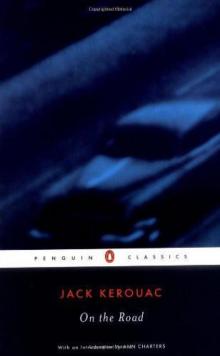 On the Road
On the Road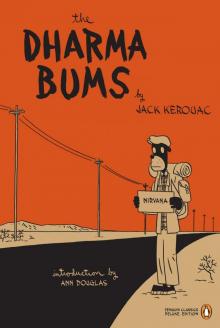 The Dharma Bums
The Dharma Bums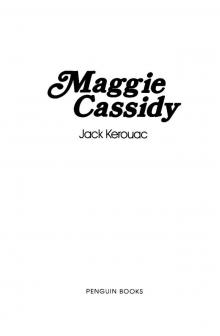 Maggie Cassidy
Maggie Cassidy Big Sur
Big Sur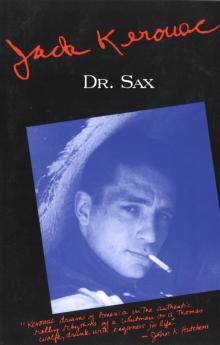 Dr. Sax
Dr. Sax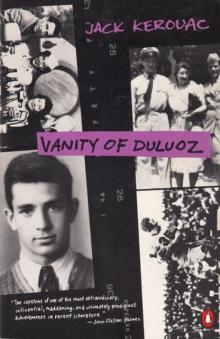 Vanity of Duluoz: An Adventurous Education, 1935-46
Vanity of Duluoz: An Adventurous Education, 1935-46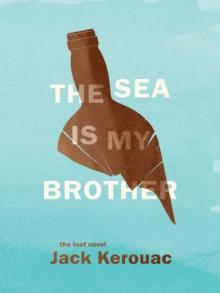 The Sea Is My Brother
The Sea Is My Brother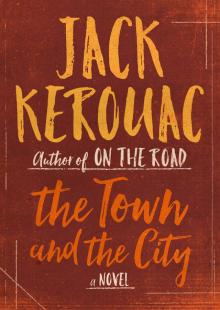 The Town and the City: A Novel
The Town and the City: A Novel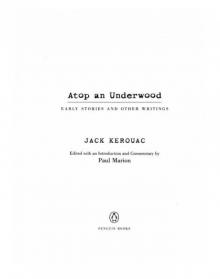 Atop an Underwood: Early Stories and Other Writings
Atop an Underwood: Early Stories and Other Writings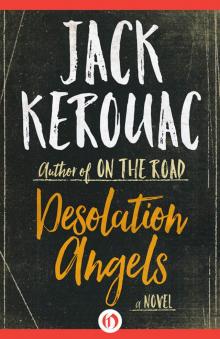 Desolation Angels: A Novel
Desolation Angels: A Novel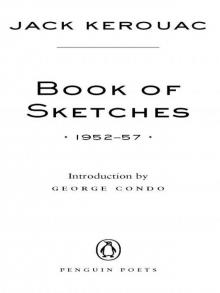 Book of Sketches
Book of Sketches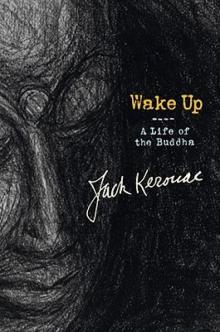 Wake Up: A Life of the Buddha
Wake Up: A Life of the Buddha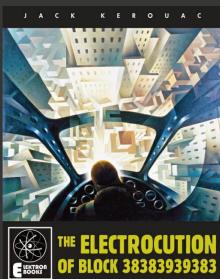 The Electrocution of Block 38383939383
The Electrocution of Block 38383939383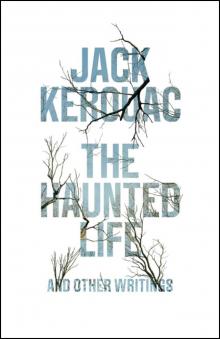 Haunted Life
Haunted Life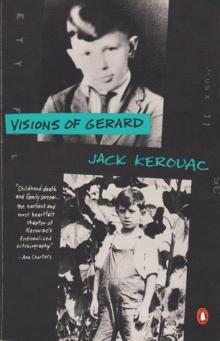 Visions of Gerard
Visions of Gerard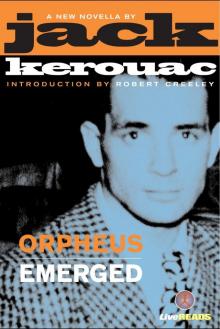 Orpheus Emerged
Orpheus Emerged Book of Blues
Book of Blues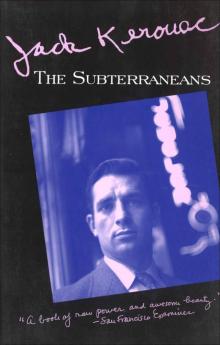 The Subterraneans
The Subterraneans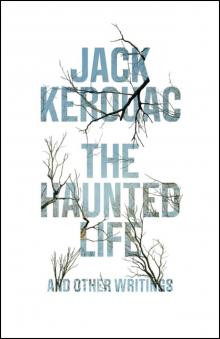 The Haunted Life
The Haunted Life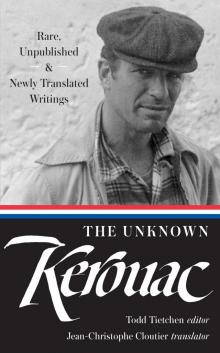 The Unknown Kerouac
The Unknown Kerouac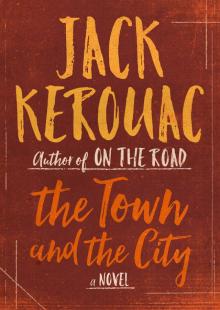 The Town and the City
The Town and the City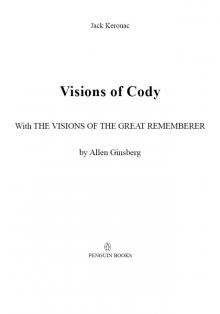 Visions of Cody
Visions of Cody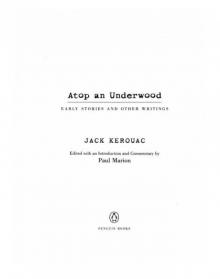 Atop an Underwood
Atop an Underwood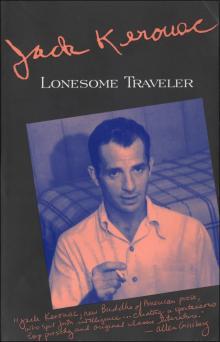 Lonesome Traveler
Lonesome Traveler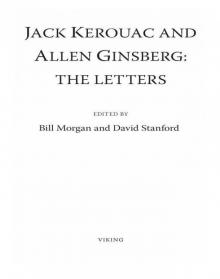 Jack Kerouac and Allen Ginsberg
Jack Kerouac and Allen Ginsberg Vanity of Duluoz
Vanity of Duluoz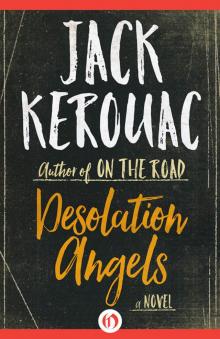 Desolation Angels
Desolation Angels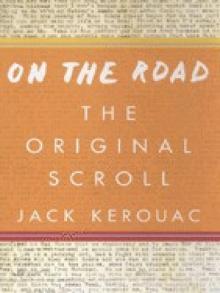 On the Road: The Original Scroll: (Penguin Classics Deluxe Edition)
On the Road: The Original Scroll: (Penguin Classics Deluxe Edition)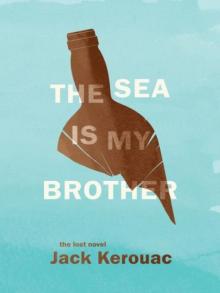 The Sea Is My Brother: The Lost Novel
The Sea Is My Brother: The Lost Novel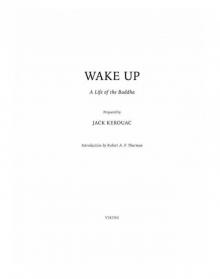 Wake Up
Wake Up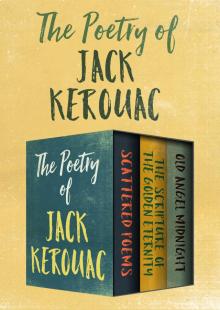 The Poetry of Jack Kerouac
The Poetry of Jack Kerouac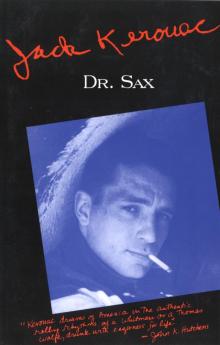 Doctor Sax
Doctor Sax